Table of Contents
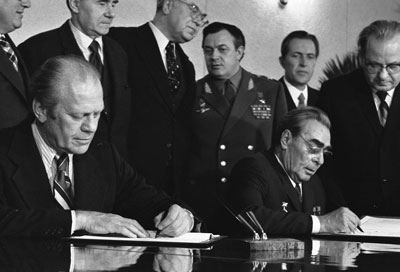
The United States and the Soviet Union first reached an agreement on strategic arms limitation in May 1972. That agreement was set to expire in 1977, so both sides pressed for a permanent and more encompassing accord. Soon after President Gerald Ford took office in 1974 he agreed to meet Soviet leader Leonid Brezhnev in Vladivostok if preliminary meetings could develop the basis for an agreement. Talks between Ford and Soviet Foreign Minister Andrei Gromyko in Washington and Secretary of State Henry Kissinger's visit to Moscow laid the groundwork for the President's meeting with Brezhnev.
This topic guide consists of a narrative written by President Ford along with a selection of digitized photographs and documents from the Ford Library's holdings.
Arrival in Vladivostok and Okeanskaya
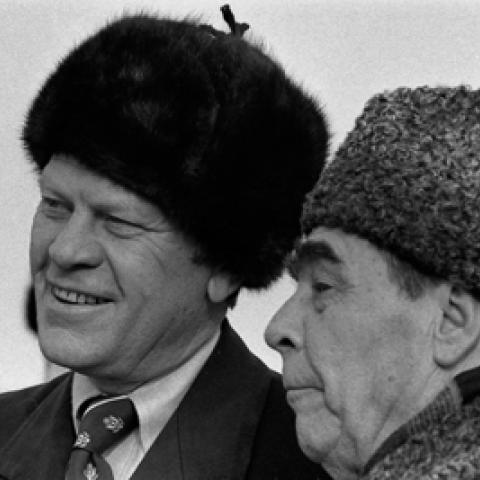
"The third stop on my Far Eastern tour was the Siberian port city of Vladivostok. [Soviet General Secretary Leonid] Brezhnev, accompanied by Foreign Minister Andrei Gromyko, had come by train from Moscow-four thousand miles across seven time zones to meet me at the airport on the morning of November 23, and from the moment we met, we got along well. 'I understand you are quite an expert on soccer,' I said as we shook hands for the first time.
'Yes, I play the left side,' Brezhnev replied, 'but I haven't played in a long time.'
'I haven't played football for a long time, either,' I told him. 'I wasn't very fast, but I could hold the line.'"
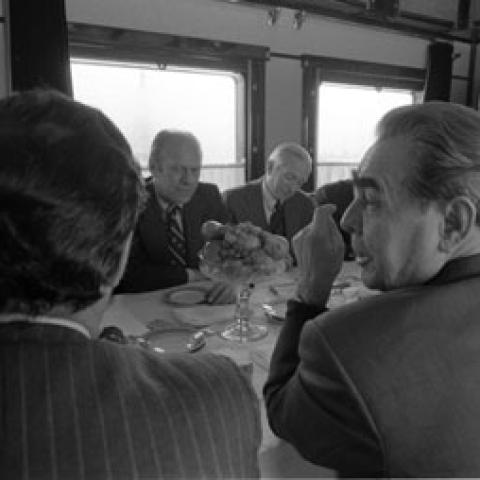
"The bantering continued as we boarded a train that would take us to the site of our conference, the small resort town of Okeanskaya. Looking out the dining car window at the snow-covered terrain, I mentioned the difficulty we had clearing snow from the streets of Washington and how snarled the traffic became when the weather turned sour. Brezhnev's bushy eyebrows arched, and he leaned forward across the table that separated us. 'Well, that will be our first deal,' he said. 'We'll send you Soviet snowplows.'
Gromyko, normally a dour man, joined in. 'Yes, snowplows,' he said, 'at a good low price.'"
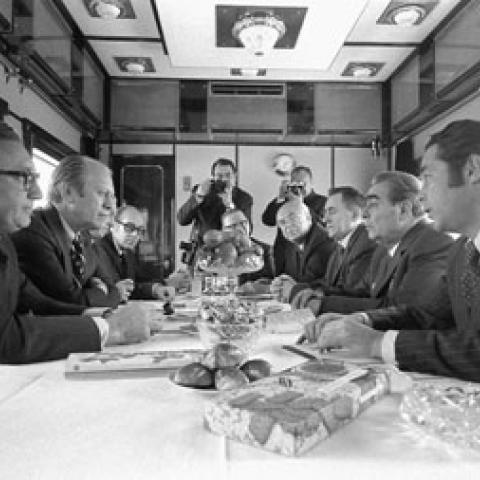
"The train ride took an hour and a half, and as our talks continued, I had a fine opportunity not only to size up Brezhnev as a world leader but also to observe a special penchant of Henry Kissinger's. Soviet stewards had piled cookies, pastries and mints on the table in the dining car, and Henry simply couldn't resist them. At first he would check to see if anyone was looking before he reached out to pluck a morsel from the plate. Then, aware that everyone knew what he was doing - the Soviets thought his antics were hilarious - he no longer tried to conceal his addiction. In that ninety-minute period he must have finished off three plates."

"The site of the talks was the Okeanskaya Sanatorium, a health spa used by vacationing personnel from local military bases. Although the Soviets had labored for ten days to spruce up the place and apply a fresh coat of paint to the main building, it still looked like an abandoned YMCA camp in the Catskills. The spartan surroundings didn't bother Brezhnev at all. He was still in an ebullient mood as he escorted us to our dacha. 'Why did you have to bring Henry Kissinger here?' he asked with mock solemnity.
'Well, it's just very hard to go anywhere without him,' I answered.
Brezhnev pretended a scowl. 'Kissinger is such a scoundrel,' he said.
But Henry was ready for that. 'It takes one to know one,' he replied."
(A Time to Heal, pp. 213-214)
Digitized Resources
- Vladivostok information
- Vladivostok maps
- Gromyko biography
- Ford arrival statement
- Press pool report
- American snowplow manufacturer's reaction
- Press pool report on train trip
- "Memcon" of Ford-Brezhnev discussions
- Okeanskaya Sanatorium background
- Press pool reports on arrival and dacha
Previous U.S.-Soviet Discussions on Strategic Arms Limitation
"Soon the joking stopped. We had come to this remote Siberian site hoping to reach an agreement that would put a cap on the arms race and further the chances for a lasting peace. Our two countries had first reached an agreement on strategic arms limitations in May 1972. That accord put a freeze on the numbers of land- and sea-based ballistic missiles on each side, both those in existence and those under construction. The Soviets could deploy 2,360 and the United States 1,710. There was no limitation on the number of heavy bombers each side could keep ready for combat. Nor was there a limitation on the number of missiles each side could equip with multiple warheads (MIRVs). And this is where the pact worked to our advantage. Even though the Soviets had built and were thereby permitted more missiles, we already had a far larger number of long-range bombers which compensated for the disparity. Additionally, we had MIRVed almost half our missiles. The Soviets were far behind us technologically and hadn't deployed any MIRVs of their own. On the other hand, the Soviet missiles had bigger warheads and greater megatonnage. (In the 1960s, U.S. military strategists had opted for smaller warheads, less megatonnage, for greater accuracy.)
That first SALT agreement would expire in October 1977. Long before that date, both sides endeavored to reach a permanent - and more encompassing - accord. Hoping to achieve such an agreement, Nixon had flown to Moscow in June. But his efforts to bring MIRVs into the new agreement had failed. The United States then decided to work for a more comprehensive approach and a longer time period - ten years rather than five. When he met with me in Washington, Gromyko suggested that a summit meeting could resolve our differences. Initially, my reaction was cool. I saw no reason to travel halfway around the world just to hear a restatement of known Soviet views. The Soviets responded by pushing harder and hinting that they would make new concessions. Kissinger returned from Moscow in October convinced that the Soviets were sincere in their desire to reach a new accord. Even before I arrived at Okeanskaya, we had agreed on the general framework of a SALT II pact. We still had to button down two things: the numbers of launchers and MIRVs permitted each side, and whether to specify equal numbers of these for each country or allow a differential - with the Soviets to have more launchers and the United States more MIRVS. Defense Secretary Schlesinger and the Joint Chiefs of Staff urged me to hold out for numerical equivalency of ballistic missiles. They didn't think the Soviets would ever agree and said that I'd probably have to accept a compromise. Kissinger didn't want that. 'Hang tough,' he said in effect, 'and they'll come around.'"
(A Time to Heal, pp. 214-215)
Digitized Resources
- Glossary of SALT terms
- History of SALT I
- SALT I agreement
- Ford-Gromyko "Memcon", 9/20/74
- Ford-Gromyko "Memcon", 9/21/74
- "Memcons" for Kissinger October trip to Moscow
- Draft agreement before the summit
Negotiating with Brezhnev - Day One (November 23, 1974)
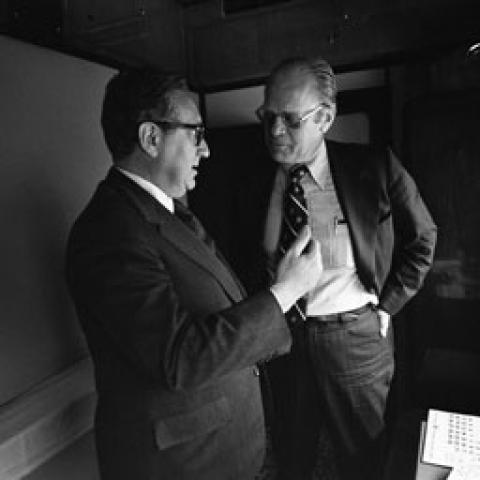
"Before my meeting with Brezhnev, Kissinger and I had talked at length about the Soviet leader's personality and negotiating techniques. Brezhnev, Henry said, would dominate the Soviet side of the discussions, but on technical points he would confer with his advisers. Invariably, Henry continued, he would lead off with an angry, blustery diatribe accusing the U.S. of sabotaging the chances for lasting peace. He would, for example, blame us for not working with the Soviets in the Middle East. But this would be primarily for home consumption. It would give him a chance to score points with the Soviet hierarchy. It would also be his way of testing my resolve. He would be curious to see if I would bend or fight back. And so, Henry maintained, we should not retreat from our position. We should be polite but firm. If they really wanted an agreement, they would be the ones to bend.
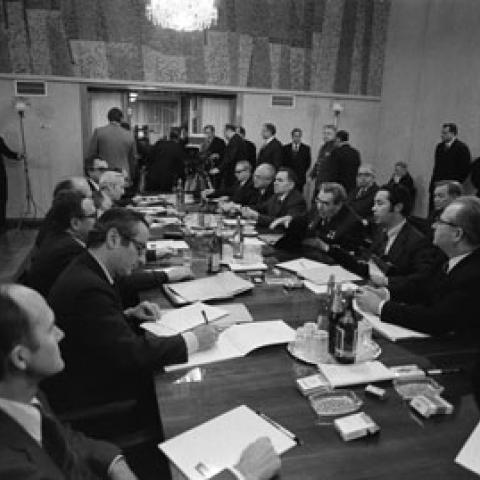
Which is precisely what transpired. No sooner had Brezhnev and I made our opening statements in the austere conference hall at Okeanskaya than we began to focus on the specific force levels that each side could have. After initially proposing different numbers - with the Soviets pushing for higher figures - we compromised at 2,400 ballistic missiles for each country. That meant they would have to reduce their launchers by about 300. Next we agreed that each side be allowed 1,320 MIRVS. We maintained our position from previous negotiations that our Forward Base System of F-4s, F-111s and FB-111s as well as the nuclear weapons we had deployed in Western Europe not be counted in our agreed-upon total of strategic weapons. Brezhnev frowned behind his wire-rimmed glasses. Chain-smoking, sipping from a glass of mineral water, he suggested a pause while he conferred with his aides. Minutes later, he returned to the conference table. Agreed, he said. That meant we had prevailed.
Now Brezhnev wanted something in return. We should stop production of the Trident submarine and cancel our plans to build the B-1 bomber. Our national security, I replied, demanded that we push forward with both. We simply couldn't rely on our aging B-52s.
Then we turned to questions of a more general nature. I assured Brezhnev that although we had economic difficulties at home, he should not assume that the U.S. was weak and getting weaker all the time. Brezhnev countered that some members of his Politburo didn't believe detente was a good idea. If he made too many concessions in his attempt to reach an accord, he would lose their support and be in trouble at home. I said I understood his predicament. Then, displaying a surprising grasp of the way our political system worked, he began talking about Congress. The Soviets had learned during Nixon's years in office that the future of their relations with the United States didn't depend solely on the decisions of the American President. Congress was a force to be reckoned with, and Brezhnev wasn't happy about that. Congress, he said, had fouled up the progress we thought we were going to make with the expansion of trade. And now it was insisting that it had the right to pass judgment on Soviet emigration policies. 'You just had elections in your country,' he said. 'What kind of a Congress will you be dealing with for the next two years?' 'Mr. General Secretary,' I replied, 'I can only say that my fingers are crossed.'"
(A Time to Heal, pp. 215-217)
Digitized Resources
- Press pool report on start of negotiations
- "Memcon" of the evening's discussions
- Kissinger press conference
- Kissinger advice on negotiating with Brezhnev
Breaks Between Sessions
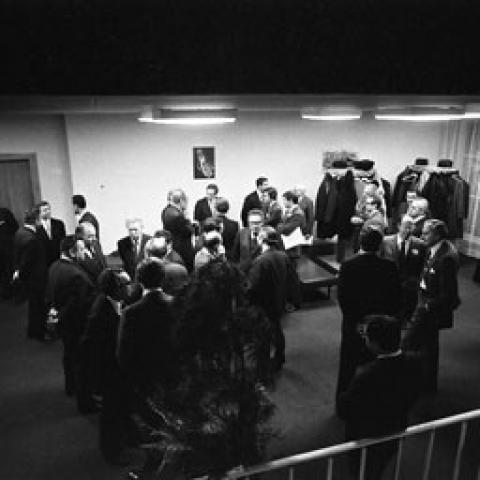
"Initially, we had planned to meet at six o'clock, talk for two hours, break for dinner and then resume the next morning. But we had made so much progress that both of us decided to cancel dinner and just keep going. We did take three short breaks to relax, walk outside in the snow and talk privately with our aides - without the possibility of our conversations being bugged.
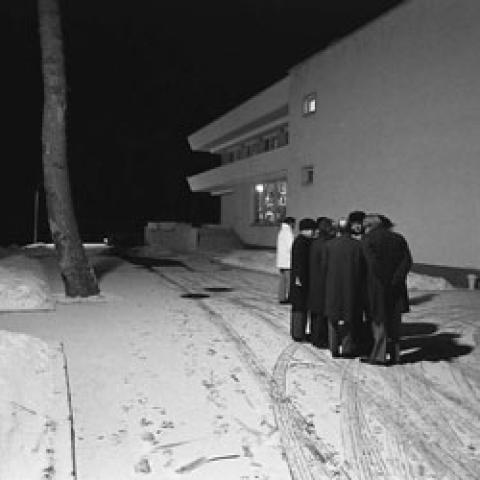
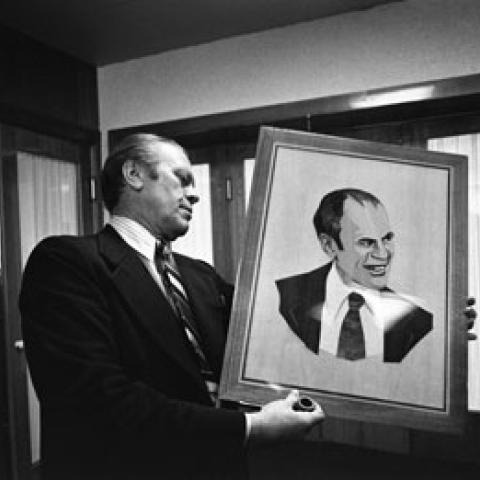
During one of these breaks, Brezhnev walked up and gave me a wood portrait of myself. It was a marvelous work, although it didn't look much like me; the artist had worked from a picture in some Russian magazine. Kennerly, Hartmann and Scowcroft were standing with a group of English-speaking Russians when I stepped outside. I held the portrait up while Kennerly began reeling off his photographs. The Russians crowded in, and I said, 'Isn't this nice? Just look at it. I think it's a great likeness.' Kennerly paused from his picture- taking and said, 'Hey now, would you look at that? They gave you a picture of Frank Sinatra.' That was one time I didn't appreciate his wise-guy humor.
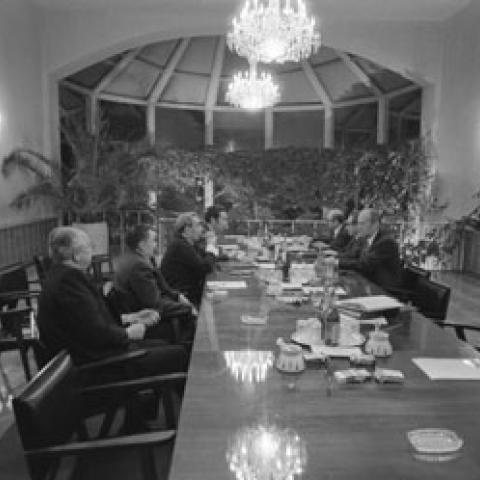
We didn't wind up our talks until after midnight, and I was famished. The Soviet chefs assigned to our quarters were preparing a late snack, and as I waited for the food to arrive, I remembered that back home in the U.S., Michigan was scheduled to play Ohio State. I told Bob Barrett, my military aide, to wake me at six o'clock with the score of the football game.
Precisely at six, Barrett entered my room. 'Mr. President, time to wake up,' he said.
'How did the game turn out? What was the score?'
'Twelve to ten,' Barrett replied, and turned to leave the room.
'Wait a minute. Who had the twelve, and who had the ten?'
'I was afraid you'd ask me that.' From the look on his face, I knew Michigan had lost. 'Yeah,' Barrett continued, the same poor kid who missed the field goal last year missed another one seconds before the end of the game. 'I knew how heartbroken that Michigan player must have been, and I found myself wishing that I were somewhere where I could easily pick up a telephone and try to brighten his day.'"
(A Time to Heal, pp. 217-218)
Digitized Resources
Negotiating with Brezhnev - Day Two (November 24, 1974)
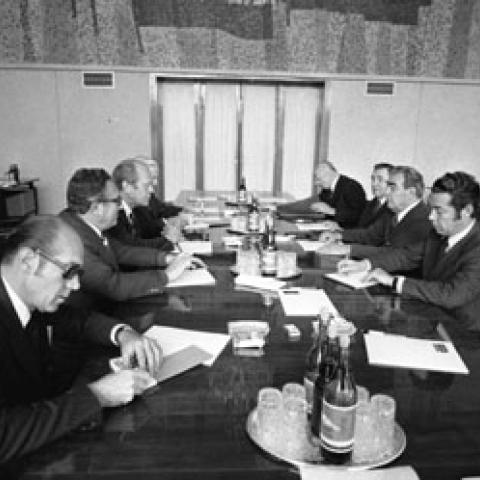
"Shortly after ten o’clock, I returned to the conference hall for our second session. This meeting was devoted to the situation in the Middle East and the progress that both sides hoped to make in reducing our military forces in Europe. Although our discussions were candid, there were no breakthroughs. But our meeting the night before had far exceeded my expectations, and I was euphoric. As soon as technicians had ironed out the few remaining problems, we would sign a SALT II accord.
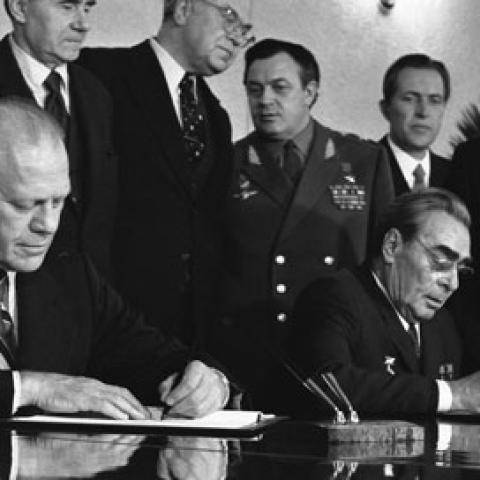
Brezhnev shared my enthusiasm. Impulsively, after a late lunch, he invited me to accompany him on a tour of Vladivostok. We climbed into the back seat of a long black limousine and headed toward the city, thirteen miles away. The local commissar, a large, dark-complexioned man wearing a thick wool coat, sat in the jump seat in front of Brezhnev, and the interpreter, Victor Sukhodrev, sat in front of me. Our conversation was natural and uninhibited. How many people lived in Vladivostok? What was the main industry? And was it always this cold? Twenty minutes later, we drove down a steep hill, entered the city and swung around the main square. A small crowd was there, and even though it was dusk, they recognized the car and applauded. The city itself reminded me of San Francisco, and I wished that I'd had more time to explore the place. But it was starting to get dark and we headed back toward Okeanskaya.
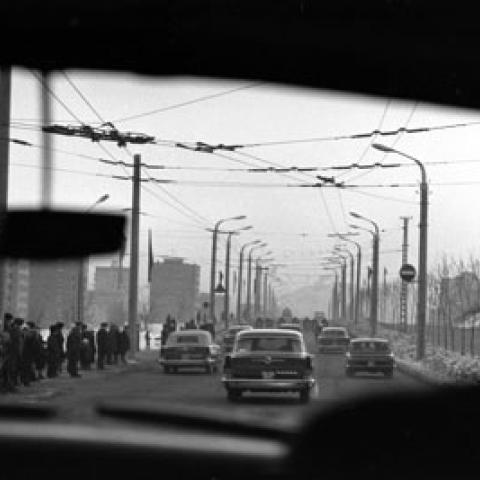
And that's when the strangest thing happened. Brezhnev reached over and grabbed my left hand with his right hand. He began by telling me how much his people had suffered during World War II. 'I do not want to inflict that upon my people again,' he said.
'Mr. General Secretary, I believe we made very significant progress,' I said. 'I hope the momentum of our meeting will continue and that next year we can finalize what we have accomplished here.'
His grip on my hand tightened, and he turned to look me in the eye. 'We have accomplished something very significant, and it's our responsibility, yours and mine, on behalf of our countries, to achieve the finalization of the document.'
'I am optimistic that we can,' I said. 'We have made so much headway. This is a big step forward to prevent a nuclear holocaust.'
'I agree with you,' he said. 'This is an opportunity to protect not only the people of our two countries but, really, all mankind. We have to do something.'
I don't remember what else was said. I do remember that he held on to my hand until the car pulled up in front of my dacha at Okeanskaya.
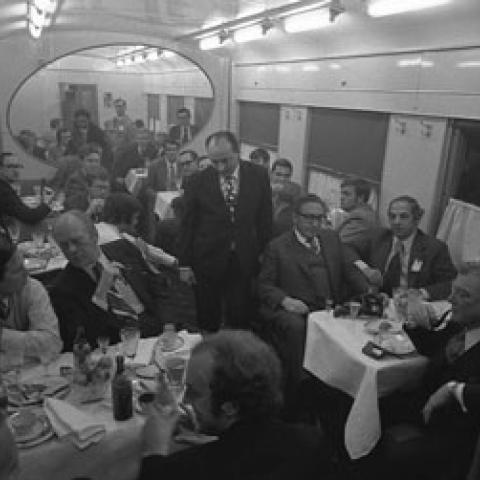
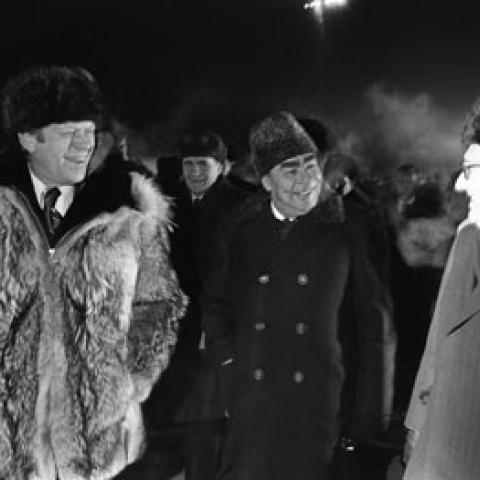
On our departure, a train took us back to the airport. Air Force One was waiting and Brezhnev walked with me to the ramp. On the first leg of our trip, we had stopped to refuel in Anchorage, Alaska. A local furrier and personal friend, Jack Kim, had presented me with a heavy Alaskan wolf coat. A warm and comfortable garment, it had served me well in Siberia. I saw Brezhnev eyeing it enviously. So just before I mounted the steps, I took off the coat and gave it to him. He put it on, and he seemed truly overwhelmed. We waved goodbye, and taxied down the runway. In another few hours we would be home. The American people would be delighted to hear that my meeting with Brezhnev had gone so well, and Congress, with some exceptions, would probably endorse the new accord. But what, I wondered, would I tell my old friend Jack Kim about his Alaskan wolf coat?
Vladivostok had been an appropriate ending to a journey designed to strengthen ties with old friends and expand areas of agreement with potential adversaries. The results of the trip had exceeded my expectations."
(A Time to Heal, pp. 218-219)
Digitized Resources
- Press pool report
- "Memcons" of the discussions
- Kissinger press conference
- Aide memoire
- Joint communiqué
- Joint statement
- Draft fact sheet
- Editorial cartoons
- President Ford's luncheon toast
- About the wolf coat
- Remarks upon return to Washington
- Report to National Security Council
Suggestions for Further Reading
The Department of State's web page on the history of SALT II contains information on the Vladivostok summit meeting. In addition to President Ford's memoir A Time to Heal, the following memoirs concern the summit.
- Clift, A. Denis. With Presidents to the Summit. Fairfax, VA: George Mason University Press: 1993, pages 53-57.
- Dobrynin, Anatoly Fedorovich. In Confidence: Moscow’s Ambassador to America’s Six Cold War Presidents. New York: Times Books: 1995, pages 322-323 and 327-333.
- Gromyko, Andrei. Memoirs. New York: Doubleday: 1989, page 284.
- Hyland, William. Mortal Rivals: Superpower Relations from Nixon to Reagan. New York: Random House: 1987, pages 73-97.
- Kissinger, Henry. Years of Renewal. New York: Simon and Schuster: 1999, pages 286-298.
- Nessen, Ron. It Sure looks Different from the Inside. New York: Simon & Schuster: 1978, pages 45-52.
Master List of Digitized Documents
All Ford Library documents used in the online exhibit are listed below, organized by collection name.
Ford Library Vertical File
- Ford, Gerald R. - Cartoons, satire, etc. - September-December 1974 [editorial cartoons]
Robert Hartmann Papers
- Box 153: President - Trips - 11/18-24/74 - Japan, Korea, USSR - Background - Vladivostok [Vladivostok and Soviet Far East background; Okeanskaya Sanatorium background]
National Security Adviser. Kissinger Reports on USSR, China and Middle East Discussions
- Box 1: October 24-27, 1974 - Kissinger/Brezhnev Talks in Moscow (1)-(3) [folder 1; folder 2; folder 3]
- Box 1: November 23-24, 1974 - Vladivostok Summit (1)-(2) [folder 1; folder 2]
National Security Adviser. Memoranda of Conversations
- Box 6: September 21, 1974 - Ford, Kissinger, Soviet Foreign Minister Andrei Gromyko [entire folder]
National Security Adviser. National Security Council Meetings File
- Box 1: NSC Meeting, December 2, 1974 [meeting minutes]
National Security Adviser. Outside the System Chronological File
- Box 1: 11/1/74-11/12/74 [Leonid Brezhnev: The Man and His Style]
National Security Adviser. Presidential Country Files for Europe and Canada
- Box 16: USSR (2) [Gromyko biography]
National Security Adviser. Presidential Subject File
- Box 19: SALT (11) [SALT fact sheet]
- Box 20: SALT (28) [draft agreement]
National Security Adviser. Temporary Parallel File of Items Opened from Unprocessed File Series
- Box A1: USSR - Gromyko File (19) [memorandum of conversation, 9/20/74]
Presidential Speeches and Statements: Reading Copies
- Box 3: 11/23/74 ‑ Arrival Statement, Vozdvizhenka Airfield, U.S.S.R. [entire folder]
- Box 3: 11/24/74 ‑ Remarks Upon Return From Trip to Japan, Republic of Korea, and USSR, Andrews Air Force Base [entire folder]
John W. "Bill" Roberts Papers
- Box 5 - President - Foreign Trips - Japan, Korea, Soviet Union - Nov. 1974 - Press Notes (3) [maps]
White House Central Files Subject File
- Box 41 - TR 11-3 - Vladivostok, USSR (General) [reaction of American snowplow manufacturer]
White House Press Releases
- Box 4B - November 23-26, 1974 [press pool reports; Kissinger press conference (day one); Kissinger press conference (day two); joint statement, joint communiqué; morning activities press release; luncheon toast]